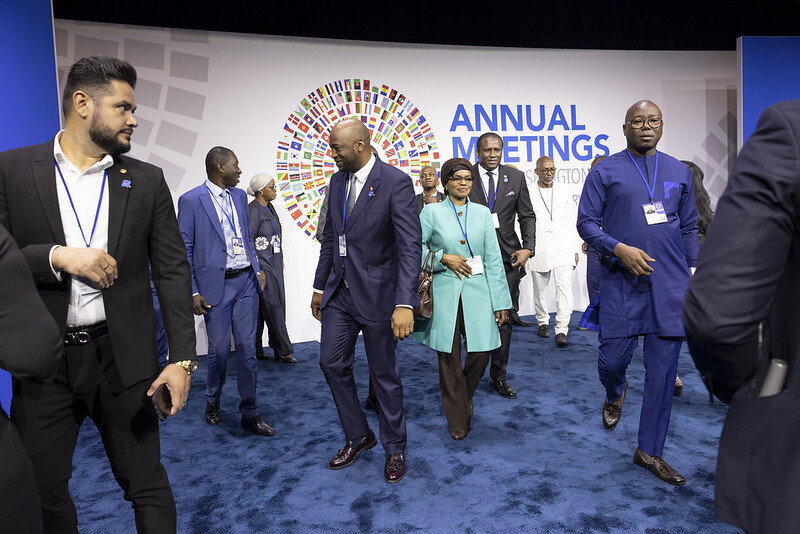The annual meetings held in Washington DC over the week offered a new glimpse of political will for making our global financial system fit for the climate and development challenges of today. However, ministers and finance institution leaders did not set a clear roadmap to help countries tackle compounding crises, so face an uphill battle to build momentum for the changes needed.
Summary & assessment – annual meetings
In good news, Malpas faced continued scrutiny, shareholders started to step up their expectations with visions for reform of the World Bank, discussions of debt and fiscal space entered a new level of shared understanding, and Barbados Prime Minister Mia Mottley continued to build support around a broad global financial reform agenda.
However, shareholders are leaving the reform agenda to World Bank management to decide in detail, which may not be sufficient; A broad-based leadership coalition is not yet emerging around the long-term reforms needed, and the low-hanging fruit of Capital Adequacy Framework and IMF reforms have not yet been agreed
The meetings should have been an opportunity to regain momentum on reallocating the $100 billion of International Monetary Fund (IMF) Special Drawing Rights (SDRs). There’s still no consensus on how to channel this potentially deal-making piece of the capital stack for clean energy transitions or other uses. The IMF needs to be able to make a clear statement that the Resilience and Sustainability Trust (RST) is fully funded, and ready to get money moving rapidly through this and other vehicles, to get developing economies moving again. It is imperative that significant progress is achieved by the spring meetings.
World Bank shareholders including all G7 countries plus Australia, the Netherlands and Switzerland put forward a high-level vision for reform of the World Bank. This follows a G20 expert group report on reform of MDB Capital Adequacy Framework which could unlock hundreds of billions in additional lending for climate and development. The World Bank management has until December to come forward with an ‘evolution roadmap’ to translate the G7+ group’s vision into concrete institutional reform.
Discussions on debt and fiscal space brought a lot of warm words on a better functioning global system – one that deals with debt distress and doesn’t pile on more unaffordable debt for developing countries. Such a system could provide fiscal redress for climate vulnerabilities. However there is no roadmap to reform, and no clear political strategy to deliver it.
The ‘Bridgetown Initiative’, a broad-ranging set of reforms to the global financial architecture promoted by Barbados’ PM Mia Mottley and others, continued to gather support, including from some G7 governments. However, there has not been a decisive political breakthrough, with few leaders from emerging markets and developing economies expressing their support. COP27 will provide another important venue to build international coalitions around this long-term structural reform agenda.
Quotes – annual meetings
Sonia Dunlop, MDB Programme Lead, E3G
“We cannot rely on the World Bank to reform itself. There has to be a clear, open process, that turns the Bank into a true force for development and climate, focused on global challenges.”
Ronan Palmer, Director, Clean Economy at E3G said:
“With so many warm words about the need for urgent, fundamental action, how have we come out of the Annuals without a clear roadmap for reform of the system? Where is the political strategy? Expectations are now high for real delivery in the year ahead.”
Available for comment
Claire Healy, US politics, Global Institutions
+1 202 420 0628, claire.healy@e3g.org
Sonia Dunlop, MDBs and climate change
+44 7970 795 278, sonia.dunlop@e3g.org
Ronan Palmer, Bridgetown Initiative, debt, fiscal space, IMF, clean economy
+353 89 491 7948, ronan.palmer@e3g.org
Melanie Brusseler, Macroeconomic outlook
+1 610 573 3444, melanie.brusseler@e3g.org
Franklin Steves, Bridgetown Initiative and CAF reform, inter-shareholder politics
+44 7484815434, franklin.steves@e3g.org
– ENDS –
Notes to Editors – annual meetings
- E3G is an independent climate change think tank with a global outlook. We work on the frontier of the climate landscape, tackling the barriers and advancing the solutions to a safe climate. Our goal is to translate climate politics, economics and policies into action. About – E3G
- These Annual Meetings come after weeks of coverage of World Bank President David Malpass’s comments on climate science. Please see previous E3G press release on this here.
- For further enquiries email press@e3g.org or phone +44 (0)7783 787 863



